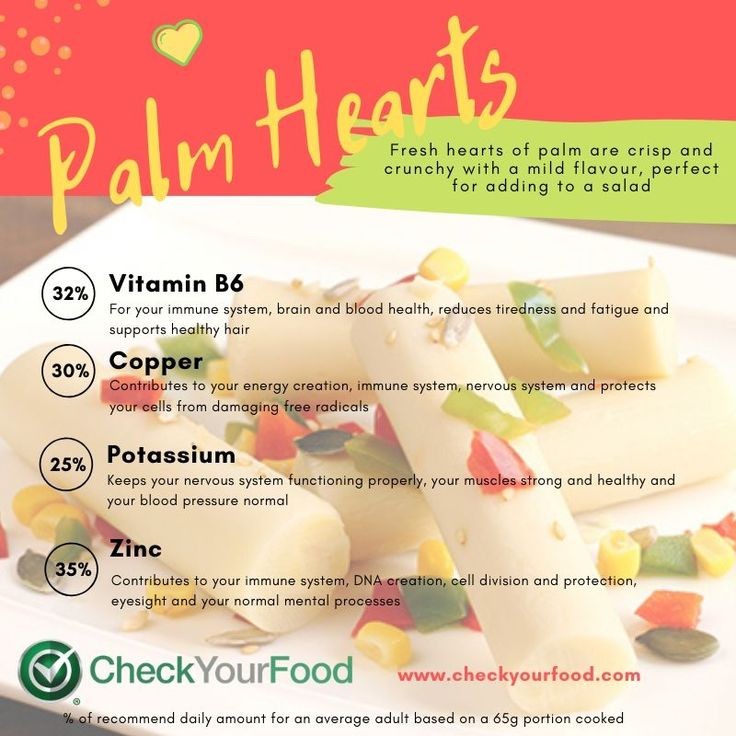
Contents
Health Benefits of Hearts of Palm
Hearts of palm are vegetables taken from certain palm trees. They are tender, white, and cylindrical. Also known as palm cabbage, palm hearts, palmito, chonta, and swamp cabbage, hearts of palm grow in the tropical and humid climates of countries around the Amazon River. You can harvest them by peeling away the rough stems and outer layers of fiber from a palm tree until you reach the soft inner core.
Hearts of palm have a mild flavor similar to artichokes, with a hint of sweetness and crunchiness. You can buy them fresh, but because they are highly perishable, hearts of palm are typically pickled and can be found in cans or jars at most supermarkets.
Despite being relatively unknown, hearts of palm are packed with vitamins, nutrients, and minerals that provide several health benefits. Understanding their nutritional value can help you decide whether to include them in your diet.
Nutritional Facts for Hearts of Palm
Hearts of palm are low in fat, carbohydrates, and calories. Instead, they are rich in proteins, minerals, and vitamins. A half cup of canned hearts of palm (73 grams) contains:
- Calories: 20
- Calcium: 42 milligrams
- Carbohydrates: 3.4g
- Fat: 0.5 grams
- Fiber: 1.8 grams
- Iron: 2.3 milligrams
- Magnesium: 27.8 milligrams
- Phosphorous: 48 milligrams
- Potassium: 129 milligrams
- Protein: 1.8 grams
- Sodium: 311 milligrams
- Sugars: 0 grams
- Vitamin C: 6.6 milligrams
- Zinc: 0.8 milligrams
Hearts of palm that have been pickled or preserved usually have added sodium. Rinsing them with cold water can significantly reduce this amount since hearts of palm themselves contain very little sodium.
QUESTION
Health Benefits of Hearts of Palm
Hearts of palm provide several potential health benefits:
Promote heart health
Hearts of palm are high in fiber, which helps lower blood pressure and control cholesterol levels.
Control blood sugar
The fiber in hearts of palm helps regulate blood sugar levels.
Reduce the risk of iron deficiency anemia
Hearts of palm are rich in vitamin C and iron, which helps prevent iron deficiency anemia.
Hearts of palm are high in fiber and water content, promoting a feeling of fullness and aiding weight loss efforts.
Enhance brain function
Adding hearts of palm to your diet helps prevent cognitive decline.
Repair tissue
Hearts of palm contain all nine essential amino acids needed for tissue repair.
Reduce symptoms of morning sickness
Vitamin B6 in hearts of palm helps reduce morning sickness.
Other benefits
Hearts of palm are rich in antioxidants and minerals like copper, potassium, phosphorus, and zinc, which help reduce the risk of various diseases and promote overall health.
How to Prepare Hearts of Palm
While you can eat hearts of palm raw, they are highly perishable. If you buy them fresh, inspect the stalks for firmness and refrigerate immediately. Hearts of palm can be grilled, boiled, pickled, and used in various dishes.
These vegetables are a good source of protein and can be used as substitutes in vegetarian and vegan cuisines.
Due to their low carbohydrate content, hearts of palm can be included in the Keto diet.
Sources: AHA Journals, American Journal of Physiology, Antioxidants, British Nutrition Foundation, Indian Journal of Medical Research, International Journal of Biomedical Science, Medical Science Monitor, Journal of Chiropractic Medicine, Journal of Research in Medical Sciences, Peach Health, The Journal of Nutritional Biochemistry, Michigan State University, National Institute of Health, Nutrients, One Green Planet, Open Heart, U.S. Department of Agriculture


